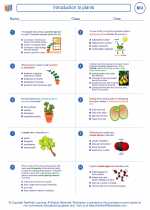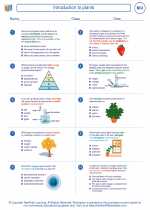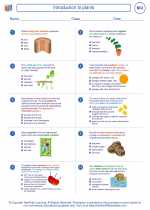Introduction to plants -> vegetative propagation
Vegetative Propagation
Vegetative propagation is a type of asexual reproduction in plants where new individuals are produced from the vegetative parts of a single parent plant. This method does not involve the formation of seeds or spores and results in offspring that are genetically identical to the parent plant. There are several methods of vegetative propagation, each with its own advantages and disadvantages.
Methods of Vegetative Propagation
- Cuttings: This method involves taking a part of the stem, root, or leaf from a parent plant and planting it in soil to grow into a new plant. Examples include stem cuttings, leaf cuttings, and root cuttings.
- Layering: In layering, a portion of the stem of the parent plant is bent and covered with soil while still attached to the parent plant. Roots develop at the bent portion, and the new plant can be separated once established.
- Division: Division involves separating a parent plant into two or more parts, each of which can grow into a new plant. This method is commonly used for plants with rhizomes or tubers.
- Grafting: Grafting involves joining the stem or bud of one plant (the scion) with the root system of another plant (the rootstock). This method is often used to propagate fruit trees and ornamental plants.
- Bulbs and Tubers: Some plants produce specialized structures such as bulbs and tubers that can be used for vegetative propagation. Examples include garlic cloves (bulbs) and potato tubers.
Advantages of Vegetative Propagation
- Preservation of desirable traits: Vegetative propagation allows the reproduction of plants with desirable characteristics, such as disease resistance or superior fruit quality.
- Rapid multiplication: It enables the rapid production of large numbers of new plants that are genetically identical to the parent plant.
- Propagation of sterile plants: Some plants do not produce seeds or have sterile flowers, making vegetative propagation the only means of reproduction.
Disadvantages of Vegetative Propagation
- Lack of genetic diversity: Since offspring are genetically identical to the parent plant, there is a lack of genetic diversity, which can make the population more susceptible to diseases and environmental changes.
- Vulnerability to pests and diseases: If the parent plant is susceptible to a particular pest or disease, all the offspring produced through vegetative propagation will also be vulnerable to the same issues.
- Dependence on the parent plant: The success of vegetative propagation is dependent on the health and vigor of the parent plant.
Study Guide
When studying vegetative propagation, it is important to understand the different methods of asexual reproduction in plants and the advantages and disadvantages associated with each method. Here are some key points to focus on:
- Describe the various methods of vegetative propagation, including cuttings, layering, division, grafting, and the use of bulbs and tubers.
- Explain the advantages of vegetative propagation, such as the preservation of desirable traits and rapid multiplication of plants.
- Discuss the disadvantages of vegetative propagation, including the lack of genetic diversity and vulnerability to pests and diseases.
- Compare and contrast vegetative propagation with sexual reproduction in plants, highlighting the differences in genetic diversity and adaptation to environmental changes.
- Illustrate the applications of vegetative propagation in agriculture, horticulture, and conservation efforts.
By thoroughly understanding the concepts and applications of vegetative propagation, you will develop a comprehensive knowledge of this important aspect of plant biology.
[Vegetative Propagation] Related Worksheets and Study Guides:
.◂Biology Worksheets and Study Guides High School. Introduction to plants

 Worksheet/Answer key
Worksheet/Answer key
 Worksheet/Answer key
Worksheet/Answer key
 Vocabulary/Answer key
Vocabulary/Answer key
 Vocabulary/Answer key
Vocabulary/Answer key
 Vocabulary/Answer key
Vocabulary/Answer key
 Vocabulary/Answer key
Vocabulary/Answer key
 Vocabulary/Answer key
Vocabulary/Answer key
